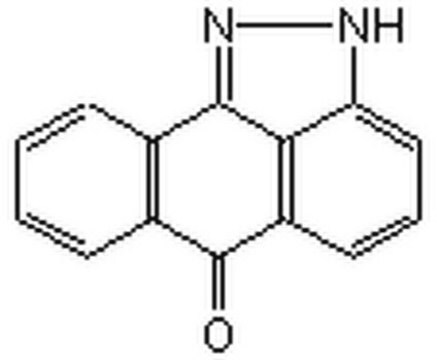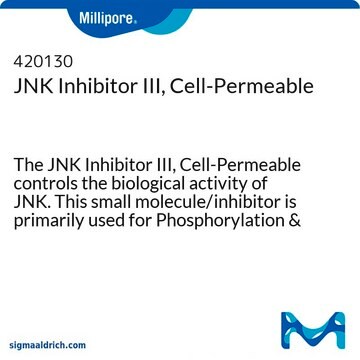506172
p38 MAP Kinase Inhibitor X, BIRB 796
The p38 MAP Kinase Inhibitor X, BIRB 796, also referenced under CAS 285983-48-4, controls the biological activity of p38 MAP Kinase. This small molecule/inhibitor is primarily used for Phosphorylation & Dephosphorylation applications.
Synonym(s):
p38 MAP Kinase Inhibitor X, BIRB 796, Doramapimod, BIRB796, 1-(5- tert-Butyl-2- p-tolyl-2H-pyrazol-3-yl)-3-[4-(2-morpholin-4-yl-ethoxy)naphthalen-1-yl]urea, JNK Inhibitor XVII, Doramapimod, BIRB796, 1-(5-tert-Butyl-2-p-tolyl-2H-pyrazol-3-yl)-3-[4-(2-morpholin-4-yl-ethoxy)naphthalen-1-yl]urea, JNK Inhibitor XVII
About This Item
Recommended Products
Quality Level
Assay
≥97% (HPLC)
form
solid
manufacturer/tradename
Calbiochem®
storage condition
OK to freeze
protect from light
color
white
solubility
DMSO: 50 mg/mL, clear, colorless
shipped in
ambient
storage temp.
2-8°C
SMILES string
CC1=CC=C(N2C(NC(NC3=CC=C(OCCN4CCOCC4)C5=C3C=CC=C5)=O)=CC(C(C)(C)C)=N2)C=C1
InChI
1S/C31H37N5O3/c1-22-9-11-23(12-10-22)36-29(21-28(34-36)31(2,3)4)33-30(37)32-26-13-14-27(25-8-6-5-7-24(25)26)39-20-17-35-15-18-38-19-16-35/h5-14,21H,15-20H2,1-4H3,(H2,32,33,37)
InChI key
MVCOAUNKQVWQHZ-UHFFFAOYSA-N
General description
Packaging
Warning
Reconstitution
Other Notes
Regan, J., et al. 2003. J. Med. Chem.46, 4676.
Pargellis, C., et al. 2002. Nat. Struct. Biol.9, 268.
Regan, J., et al. 2002. J. Med. Chem.45, 2994.
Legal Information
Signal Word
Warning
Hazard Statements
Precautionary Statements
Hazard Classifications
Acute Tox. 4 Oral
Storage Class Code
11 - Combustible Solids
WGK
WGK 3
Flash Point(F)
Not applicable
Flash Point(C)
Not applicable
Certificates of Analysis (COA)
Search for Certificates of Analysis (COA) by entering the products Lot/Batch Number. Lot and Batch Numbers can be found on a product’s label following the words ‘Lot’ or ‘Batch’.
Already Own This Product?
Find documentation for the products that you have recently purchased in the Document Library.
Customers Also Viewed
Our team of scientists has experience in all areas of research including Life Science, Material Science, Chemical Synthesis, Chromatography, Analytical and many others.
Contact Technical Service










